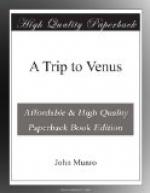“Yes. Each has a peculiarity marking it from all the rest. For example, two or more may resemble each other in colour or hardness, but not in weight.”
“Precisely. Now, by comparing their spectra can we not be led to distinguish a particular quality, and grasp the idea of it? In short, can the Martians not impress that idea on us by their spectro-telegraph?”
“I see what you mean,” said Professor Gazen; “and, now I think of it, all the spectra we have seen belong to the group called ’metals of the alkalies and alkaline earths,’ which, of course, have distinctive properties.”
“At first, I should think the Martians would only try to attract our notice by striking spectra.”
“Lithium is the lightest metal known to us.”
“Well, we might get the idea of ‘lightness’ from that.”
“Sodium,” continued the professor, “sodium is a very soft metal, with so strong an affinity for oxygen that it burns in water. Manganese, which belongs to the ‘iron group,’ is hard enough to scratch glass; and, like iron, is decidedly magnetic. Copper is red—”
“The signals for colour we might get from the spectra direct.”
“Mercury or quicksilver is fluid at ordinary temperatures, and that might lead us to the idea of movement—animation—life itself.”
“Having got certain fundamental ideas,” I went on, “by combining these we might arrive at other distinct conceptions. We might build up an ideographic or glyphic language of signs—the signs being spectra. The numerals might be telegraphed by simple occultations of the light. Then from spectra we might pass by an easy step to equivalent signals of long and short flashes in various combinations, also made by occulting the light. With such a code, our correspondence might go on at great length, and present no difficulty; but, of course, we must be able to reply.”
“If the Martians are as clever as you are pleased to imagine, we ought to learn a good deal from them.”
“I hope we may, and I’m sure the world will be all the better for a little superior enlightenment on some points.”
“Well, we must follow the matter up, at all events,” said the professor, taking another peep through the telescope. “For the present the Martian philosophers appear to have shut up shop; and, as my nebula has now risen, I should like to do a little work on it before daybreak. Look here, if it’s a fine night, can you join me to-morrow? We shall then continue our observations; but, in the meanwhile, you had better say nothing about them.”
On my way home I looked for the ruddy planet as I had done in the earlier part of the night, but with very different feelings in my heart. The ice of distance and isolation separating me from it seemed to have broken down since then, and instead of a cold and alien star, I saw a friendly and familiar world—a companion to our own in the eternal solitude of the universe.




